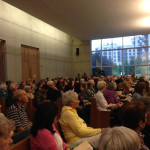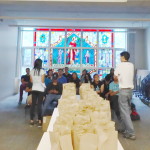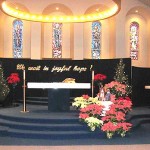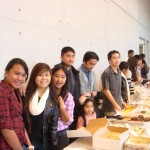The letter of St. James could be called the first social encyclicals of the Church. James challenges the attitudes and behaviors he sees developing in the struggling Christian communities. Very few if any of the early church were people of power or influence. Most were ordinary struggling men and women trying to keep their heads above water but even with that they were developing their own pecking order. Remember the mother of the sons of Zebedee wanting a special place for her sons James and John among the apostles? Her request caused no end of grief within the group.
James wanted the men and women in his community to know that belonging to Christ they belonged to one another. They were to care for and protect one another. They were to build each other up in their faith and be there for one another in their needs. Community was more important than any rugged individualism.
James insisted everyone be doers of the word not just listeners. His famous quote that caused so much conflict at the time of the Reformation was ‘faith without good works is dead’. James gives this example, ‘if a brother or sister is naked and lacks daily food and one of you says to them,’ go in peace, keep warm and eat your fill and yet you do not supply their bodily needs, what good is that? Faith by itself, if it has no good works, is dead.’
For James religion that is pure and undefiled before God is this ‘to care for orphans and widows in their distress and keep oneself unstained by this world.
In today’s reading James cautions people about showing favoritism towards people of influence especially when they come together as a community in prayer. The front rows were not to be reserved for the high and mighty.
Jesus certainly had rich friends and enjoyed their hospitality. It was a rich man Joseph of Arimathea who provided his grave. But most of his time was spent with men and women on the fringes of society. He went out of his way to be with the dispossessed, people on the fringes, men and women excluded from society. He was always there for the poor.
If we were to measure the amount of space in the Gospels devoted to the hurt or the poor and compare it to any other pet issue we cherish as the “litmus test” of our faith, there is little doubt that the sick and needy are more important than any other reality.
This is our Labor Day weekend. Can we give a thought and say a prayer for the too many young men and women who are un-employed or under employed here in the city. For all their education they remain jobless. Many of these good young people find themselves in the humiliating circumstance of still living at home and depending of their parents.
Can we give a thought and say a prayer for the men and women who make up the working poor of our city. These are good people holding down two, maybe three jobs, accepting less than the minimum wage lest they lose their jobs.
Can we give a thought and say a prayer for the men and women working in the sweat shops of Toronto. Sweat shops are not just in India or Bangladesh .St. James has a message for the owners of these places. ‘Come now you rich ..Listen, the wages of the labourers who mowed your fields, which you kept back by fraud cry out, and the cries of the harvesters have reached the ears of the Lord of hosts.
Unfortunately these good people, and these issues of justice and fairness are not the issues talked about in all the banal rhetoric that’s boring us in the political talks we have to endure these next weeks.
On this Sunday and at the Mass on the Labor Day weekend be mindful of these good men and women and offer a prayer for them in all these different and difficult circumstances of their lives, remembering that for all of us faith without the good work of supporting each other in our different needs is dead.
 Founded by St. Paul of the Cross, every Passionist takes a special vow to spend his or her energies in promoting remembrance of the sufferings of Jesus, the memory of the Cross, and reflection of the meaning of the Cross for the world.
Founded by St. Paul of the Cross, every Passionist takes a special vow to spend his or her energies in promoting remembrance of the sufferings of Jesus, the memory of the Cross, and reflection of the meaning of the Cross for the world.




